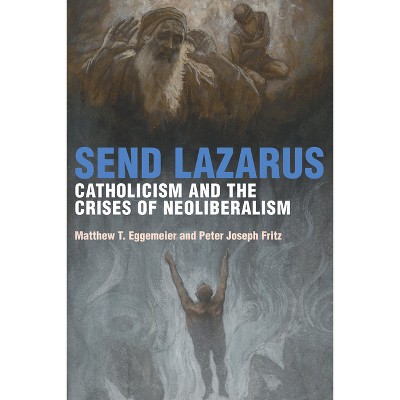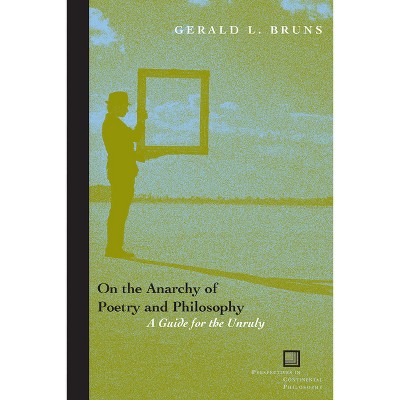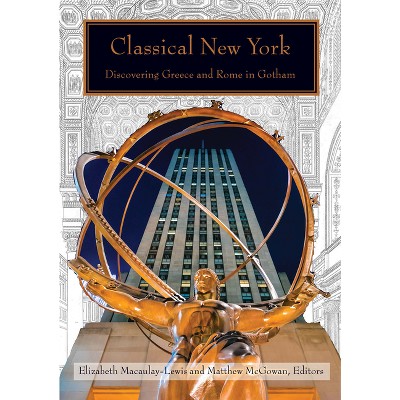$35.00 when purchased online
Target Online store #3991
About this item
Highlights
- A dramatic and necessary rethinking of the meaning of Democracy Democratic Anarchy grapples with an uncomfortable but obvious truth inimical to democracy: both aesthetics and politics depend on the structuring antagonism of inclusion and exclusion.
- About the Author: Matthew Scully is Lecturer in American Literature and Culture at the University of Lausanne.
- 256 Pages
- Literary Criticism, American
Description
About the Book
"At its core, Democratic Anarchy: Aesthetics and Political Resistance in US Literature grapples with an uncomfortable but obvious truth inimical to democracy: both aesthetics and politics depend on the structuring antagonism of inclusion and exclusion. Yet in Democratic Anarchy, Scully asks, how can "the people" be represented in a way that acknowledges what remains unrepresentable? What would it mean to face up to the constitutive exclusions that haunt U.S. democracy and its anxious fantasies of equality? Synthesizing a broad range of theoretical traditions and interlocutors-including Lacan, Ranciáere, Edelman, and Hartman-Democratic Anarchy polemically declares that there has never been, nor can there ever be, a realized democracy in the U.S. because democracy always depends on the hierarchical institution of a formal order by one part of the population over another. Engaging with an expansive corpus of American literature and art (Harriet Jacobs, Nathaniel Hawthorne, Louis Zukofsky, Thomas Pynchon, Toni Morrison, Theresa Hak Kyung Cha, Nari Ward, Ocean Vuong, and Safiya Sinclair), Democratic Anarchy argues that many liberal concepts and institutions are in fact structurally opposed to democratic equality because they depend on regulating what can appear and in what form. By focusing on works that disrupt this regulatory impulse, Scully shows how rhetorical strategies of interruption, excess, and disorder figure the anarchic equality that inegalitarian fantasies of democracy disavow. Democratic Anarchy develops a rigorous theory of equality that refuses to repeat the inequalities against which it positions itself, and it does so by turning to moments of resistance-both aesthetic and political-inaugurated by the equality that inheres in and antagonizes the order of things. The breadth of the book's theoretical and literary engagements will make it of interest not only to scholars of American literary studies but to anyone invested in contemporary literary and theoretical debates"--Book Synopsis
A dramatic and necessary rethinking of the meaning of Democracy
Democratic Anarchy grapples with an uncomfortable but obvious truth inimical to democracy: both aesthetics and politics depend on the structuring antagonism of inclusion and exclusion. Yet in Democratic Anarchy, Matthew Scully asks, how can "the people" be represented in a way that acknowledges what remains unrepresentable? What would it mean to face up to the constitutive exclusions that haunt U.S. democracy and its anxious fantasies of equality? Synthesizing a broad range of theoretical traditions and interlocutors--including Lacan, Rancière, Edelman, and Hartman--Democratic Anarchy polemically declares that there has never been, nor can there ever be, a realized democracy in the U.S. because democracy always depends on the hierarchical institution of a formal order by one part of the population over another. Engaging with an expansive corpus of American literature and art (Harriet Jacobs, Nathaniel Hawthorne, Louis Zukofsky, Thomas Pynchon, Toni Morrison, Theresa Hak Kyung Cha, Nari Ward, Ocean Vuong, and Safiya Sinclair), Democratic Anarchy argues that many liberal concepts and institutions are in fact structurally opposed to democratic equality because they depend on regulating what can appear and in what form. By focusing on works that disrupt this regulatory impulse, Scully shows how rhetorical strate-gies of interruption, excess, and disorder figure the anarchic equality that inegalitarian fantasies of democracy disavow. Democratic Anarchy develops a rigorous theory of equality that refuses to repeat the inequalities against which it positions itself, and it does so by turning to moments of resistance--both aesthetic and political--inaugurated by the equality that inheres in and antago-nizes the order of things.Review Quotes
All readers of Scully. . . will find their certainties questioned, their convictions probed, and should relish seeing their favorite literary touchstones re-illuminated in the strobe light of political relevance and political impotence.-- "Anglia: Journal of English Philology"
Drawing on the work of Jacques Rancière in particular, Democratic Anarchy offers a compelling theory of democracy and an incisive critique of consensus politics in the United States. Its sharp rhetorical readings of diverse examples of US literature draw out a vision of radical equality beyond the limits of representation.---Christian P. Haines, author of A Desire Called America: Biopolitics, Utopia, and the Literary Commons
About the Author
Matthew Scully is Lecturer in American Literature and Culture at the University of Lausanne. His work has appeared in numerous journals, including the Journal of Modern Literature, Diacritics, African American Review, American Literature, Critical Inquiry, and Postmodern CultureDimensions (Overall): 9.0 Inches (H) x 6.0 Inches (W) x .64 Inches (D)
Weight: .92 Pounds
Suggested Age: 22 Years and Up
Sub-Genre: American
Genre: Literary Criticism
Number of Pages: 256
Publisher: Fordham University Press
Theme: General
Format: Paperback
Author: Matthew Scully
Language: English
Street Date: July 2, 2024
TCIN: 93786493
UPC: 9781531507077
Item Number (DPCI): 247-28-9041
Origin: Made in the USA or Imported
If the item details above aren’t accurate or complete, we want to know about it.
Shipping details
Estimated ship dimensions: 0.64 inches length x 6 inches width x 9 inches height
Estimated ship weight: 0.92 pounds
We regret that this item cannot be shipped to PO Boxes.
This item cannot be shipped to the following locations: American Samoa (see also separate entry under AS), Guam (see also separate entry under GU), Northern Mariana Islands, Puerto Rico (see also separate entry under PR), United States Minor Outlying Islands, Virgin Islands, U.S., APO/FPO
Return details
This item can be returned to any Target store or Target.com.
This item must be returned within 90 days of the date it was purchased in store, shipped, delivered by a Shipt shopper, or made ready for pickup.
See the return policy for complete information.
Trending Fiction

$11.98 - $27.49
was $17.99 - $32.99 New lower price
5 out of 5 stars with 7 ratings

$11.98 - $23.49
was $17.99 - $32.99 New lower price
4.7 out of 5 stars with 36 ratings

$13.98 - $17.48
Lower price on select items
4.7 out of 5 stars with 497 ratings









